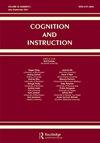Read Me Last: Constructing a Scholarly Catchment Through a Black Feminist Reading
IF 2.6
1区 心理学
Q2 PSYCHOLOGY, EDUCATIONAL
引用次数: 1
Abstract
In this commentary, I highlight the importance of my role, your role, our role in engaging this special issue, “STEM Learning: For Whom and Toward what ends?,” as researchers, scholars, and, above all, as readers in the learning sciences. The guest editors, Maxine McKinney de Royston and Tesha Sengupta-Irving, assert a forceful question that is unrelenting in its two parts. The question pushes us past the ubiquitous and high-minded mantra, STEM for all (see, for example, Martin, 2003) and beyond the purported and played-out purpose of participation and access to the political economy as the sole means for learning (see, for example, Bullock, 2017). I read the guest editors’ questions, following Philip, Bang, and Jackson (2018) and The Politics of Learning Writing Collective (2017), as a demand for politically-salient knowledge production within the learning sciences at this particular political moment and an acknowledgement of STEM learning as a particular oppressive context. Equally demanding, the special issue approaches this question not only with theoretical and philosophical imaginings of what STEM learning can be, but resolves the question through praxis, e.g., inside of the unruly reality of classrooms, the world wide web, community centers, and, in one case, the kitchen table. Each article seeks to manage this ambitious call teetering at great heights within microand mesocontexts of learning to answer the most pressing question for those of us within STEM and deeply concerned about the growing artifices of social inequality and environmental neglect in our local and global communities. How, then, might we read this special issue in a way that maintains a measure of scholarly and activist accountability to the field of learning sciences and, simultaneously, engenders the necessary support, i.e., scholarly catchment, so that these authors are not holding up an edifice of social imaginaries and radically liberatory futures in STEM learning on their own? Further, what are the challenges in reading as a scholarly catchment? Such a question is not a matter of reading generously but responsibly and inside of our humanity.《最后读我:通过黑人女权主义阅读构建学术集水区》
在这篇评论中,我强调了我的角色、你的角色、我们在参与这期特刊《STEM学习:为了谁和为了什么目的?》中的角色的重要性,作为研究人员、学者,最重要的是,作为学习科学的读者。客座编辑Maxine McKinney de Royston和Tesha Sengupta Irving提出了一个强有力的问题,这个问题分为两部分。这个问题让我们超越了无处不在、思想高尚的咒语,即全民STEM(例如,见Martin,2003),超越了参与和利用政治经济作为唯一学习手段的所谓和实际目的(例如,参见Bullock,2017)。继Philip、Bang和Jackson(2018)和the Politics of Learning Writing Collective(2017)之后,我阅读了客座编辑的问题,认为这是在这个特殊的政治时刻对学习科学中政治突出知识生产的需求,也是对STEM学习作为一种特殊压迫背景的承认。同样要求很高的是,这本特刊不仅通过对STEM学习的理论和哲学想象来解决这个问题,而且通过实践解决了这个问题,例如,在教室、万维网、社区中心的不规则现实中,在一个案例中,还有餐桌。每一篇文章都试图在学习的微观和中等背景下处理这一雄心勃勃的呼吁,以回答我们这些STEM内部的人最紧迫的问题,并深切关注我们当地和全球社区日益严重的社会不平等和环境忽视。那么,我们如何阅读这本特刊,以保持对学习科学领域的学术和活动家问责制,同时产生必要的支持,即学术聚集,从而使这些作者不会在STEM学习中独自支撑一座社会想象的大厦和彻底解放的未来?此外,作为一个学术领域,阅读面临哪些挑战?这样的问题不是一个慷慨的阅读问题,而是一个负责任的、人性的问题。
本文章由计算机程序翻译,如有差异,请以英文原文为准。
求助全文
约1分钟内获得全文
求助全文
来源期刊

Cognition and Instruction
Multiple-
CiteScore
7.90
自引率
12.10%
发文量
22
期刊介绍:
Among education journals, Cognition and Instruction"s distinctive niche is rigorous study of foundational issues concerning the mental, socio-cultural, and mediational processes and conditions of learning and intellectual competence. For these purposes, both “cognition” and “instruction” must be interpreted broadly. The journal preferentially attends to the “how” of learning and intellectual practices. A balance of well-reasoned theory and careful and reflective empirical technique is typical.
 求助内容:
求助内容: 应助结果提醒方式:
应助结果提醒方式:


